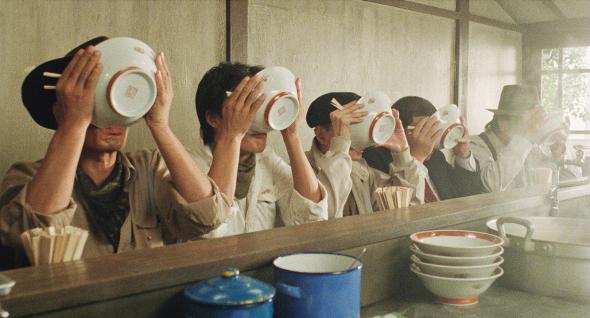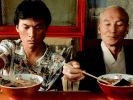Eye For Film >> Movies >> Tampopo (1985) Film Review

There are some films which you should not see at the cinema unless you have a booking at a good restaurant immediately afterwards, and some you should not watch at home without a fast spread out before you. Tampopo is one of these.
We begin in a cinema where a gangster and his girlfriend are presented with a fantastic spread of food before their film begins. It's much more civilised, the gangster explains, that the intrusive crunching of crisps whilst a film is running. Breaking the fourth wall, he asks what we are eating. It's more than just a matter of culinary curiosity. This is a film which explores the social side of eating and the relationship between food ad love. The gangster and his girlfriend engage in some of the hottest food-based sex scenes ever committed to celluloid, but the high glamour of their lifestyle is balance by humbler tales which are every bit as compelling.

Tampopo (Nobuko Miyamoto), the title character, is a young widow trying to keep her deceased husband's ramen shop going whilst she raises her small son. It's a struggle: the quality of the food is average at best and the place has become a hang-out for local bruisers. One night, two hungry truckers stop by for a bite to eat and, after one of them gets into a fight, a friendship develops. The older of the two, cowboy-hatted Gorô (Tsutomu Yamazaki) is a man who cooks for the love of it, and he agrees to take Tampopo on as student. There is much joyful play on the traditional form of the martial arts film, with the taciturn drifter putting his student through her paces. Tampopo goes running to build up her stamina, lifts heavy pots of water around her kitchen in gruelling training routines, and repeatedly has to endure the humiliation of falling short of her goals. Meanwhile Gorô, impressed by her persistence, quietly falls in love with her.
If you thought cooking ramen simply involved opening a packet over some boiling water and waiting for a bit, this film will show you how wrong you are. In its focus on such a simple dish, it celebrates the particularly Japanese virtue of dedicating oneself to a task in order to master it, thereby giving meaning to life and contributing to the perfection of society. Yet fancier foods are on display here too. A young associate dining with his corporate superiors, only one of whom can apparently read French, embarrasses them all not just with his language skills but with his gastronomic expertise; and that's just the start of it. In another scene, a supermarket manager is tormented by an elderly woman's habit of squeezing alll the food in his store. A choking man is saved using a hoover-based alternative to the Heimlich manoeuvre. And there's a scene in which Tampopo faints at the sight of a pig's head as if struck by clairvoyant awareness of the goings-on in a certain English university at that very time.
Every little detail in these scenes is beautifully observed. Although social etiquette varies around the world, there's a universality to the situations in which characters find themselves, and the humour translates beautifully. The food, meanwhile, is divine. A keen cook himself, director Jûzô Itami (Miyamoto's husband) was determined that nothing featured in the film should be a mere prop; that it should be as good (or, in some cases, as bad) as it looked. In several cases, acclaimed chefs appear in the film, usually without dialogue, sometimes with only their hands visible, but the quality of their work is unmistakable.
The film was a labour of love for all involved and it shows in every detail. Stories are told with few words. Itami's romance with food has the character of mature love nurtured over decades, yet it is also playful, provocative, and spiked with vicious wit. Tampopo is a joy from start to finish.
Reviewed on: 01 May 2017















